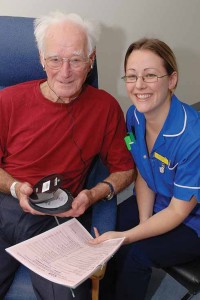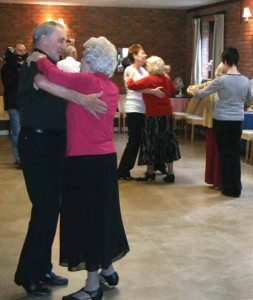‘It’s priceless’ – Dorset Blind Association
Brian Cormack looks at the valuable work of the Dorset Blind Association
Published in October ’15
Despite approaching its centenary in 2018, Dorset Blind Association is hardly a high profile charity, but to the thousand or so people it helps every month across the county its services are invaluable.
‘Literally,’ says Chief Executive Officer Jonathan Holyhead. ‘One man told me recently that it’s impossible to put a value on what the charity does for him, he said it’s priceless.’
Having started life at the end of the Great War the Association’s chief purpose in the early years was to distribute small sums of money to blind people, many of them former soldiers. That role gradually evolved as the charity became an umbrella organisation for a series of very local social clubs and support groups for people dealing with severe sight loss, but for the last 20 years it has been much more involved in actively helping those it can.
‘Our aim is to enable people living with blindness and severe sight loss to lead the lives they want to as happily, healthily and independently as they’re able,’ says Jonathan.
That help varies enormously from assisting with relatively minor tasks to supporting people through potentially quite traumatic times as they come to terms with their severe sight loss. The charity’s team of Community Support Workers are spread throughout
the county with each one managing as many as 50 local volunteers.
‘In some cases the volunteers have been with us for 20 or 30 years and they are absolutely the lifeblood of the organisation, I hold them in the highest esteem, but without paid staff to manage, train and take responsibility there would be no volunteers.
‘A growing number of our volunteers are people that have come to us for help. If you’ve recently been diagnosed the best person to speak to is someone who has trodden the path before. The help each person needs depends largely on how they react to their diagnosis and every single case is different, but peer support and someone else’s lived-life experience is crucial to helping people adjust and for the volunteer, it is all part of them feeling they are needed and still have an active role to play.’
Last year rising costs and falling income, including the end of a five-year National Lottery grant, meant Dorset Blind Association had to cut some services and in an effort to save £50,000 the community support team was halved with three people losing their jobs.
So the announcement in July that the charity is to receive £411,751 from the Big Lottery Fund over the next five years to help fund its work across Dorset was more than welcome. The grant primarily guarantees that at least four community support workers will be employed during those five years and will also fund some development work around the charity’s infrastructure.

Jonathan (left) at the launch of the Acoustic Shooting Club with Cathy Cox of Talbot Village Trust, which funded the equipment, Ray Gunning, the DBA volunteer whose brainchild the club is and John Lever, former head of Canford School, which provides free use of its rifle range
‘The grant award is a ringing endorsement that the work of Dorset Blind Association is wanted, needed, effective and appreciated and I hope will also act as a catalyst to encourage others to support us too,’ says Jonathan. ‘The competition for this funding is intense and, quite rightly, Big Lottery only awards grants of this size to organisations which demonstrate an ability to help a significant number of people and in ways which really matter and make a difference.’
This year Jonathan celebrated the tenth anniversary of his arrival at Dorset Blind Association in May 2005 to work part time in a commercial capacity. He was in the process of winding down his own business and was looking for a more altruistic opportunity within the community.
‘It was purely by chance that I ended up at Dorset Blind Association, but within nine months the chief executive had left and the trustees asked me if I would take the helm and steady the ship for a while – I’ve been here ever since.

Dorset Blind Association volunteer drivers Gill Brown and Iris Harmer, ‘absolutely the lifeblood of the organisation,’ says Jonathan
‘I’ve been very fortunate and enjoyed the complete backing of the trustees and in John Andrews, whose sudden death last Christmas was a huge emotional shock to everyone connected with the charity, the board had a very passionate and able chairman who will be
greatly missed.’
Not for the first time in its long history the charity is at a crossroads, but especially with the boost of the recent Big Lottery grant, Jonathan remains upbeat and relentlessly positive about the future: ‘It is incredibly challenging but that’s not a bad thing as I believe charities should be challenged. It’s what drives us forward and for me it always comes back to the people we’re able to help.
‘I was talking to a young lad recently at the rifle range at the Acoustic Shooting Club we operate and he told me he’d had a terrible time the day before as he’d been given some bad news about his deteriorating sight.
‘He’d gone home from the hospital feeling very miserable, but then he remembered he was due to go to the shooting club in the morning and it lifted his spirits and made him feel better. He was able to get on with organising his clothes for the next day and thinking about meeting up with everyone, it gave him something to look forward to.
‘And that’s the reward in this job, it’s being able to make a difference to people who are less fortunate than ourselves – with us they have hope, without us they could well be facing crisis.’ ◗




